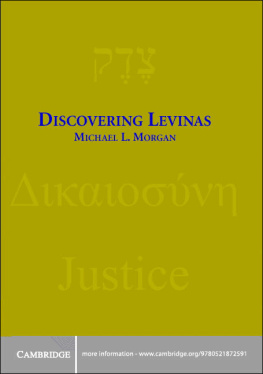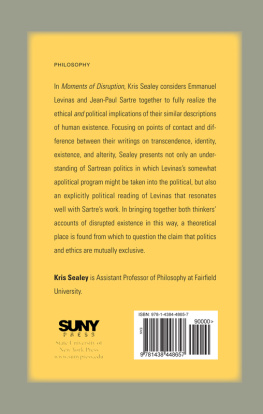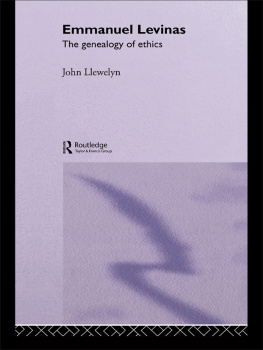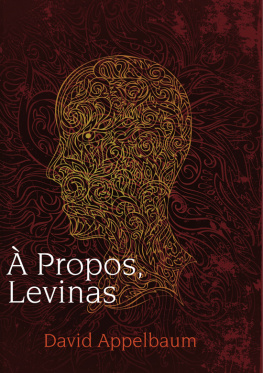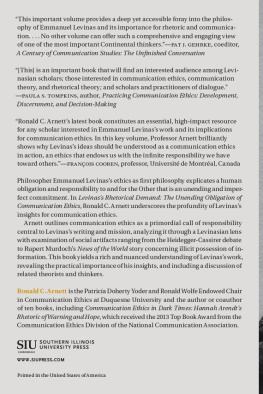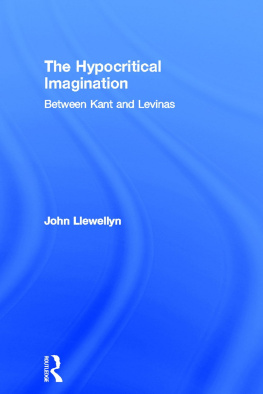Lévinas Emmanuel - Discovering Levinas
Here you can read online Lévinas Emmanuel - Discovering Levinas full text of the book (entire story) in english for free. Download pdf and epub, get meaning, cover and reviews about this ebook. City: New York, Cambridge, England, year: 2009, publisher: Cambridge University Press, genre: Religion. Description of the work, (preface) as well as reviews are available. Best literature library LitArk.com created for fans of good reading and offers a wide selection of genres:
Romance novel
Science fiction
Adventure
Detective
Science
History
Home and family
Prose
Art
Politics
Computer
Non-fiction
Religion
Business
Children
Humor
Choose a favorite category and find really read worthwhile books. Enjoy immersion in the world of imagination, feel the emotions of the characters or learn something new for yourself, make an fascinating discovery.
- Book:Discovering Levinas
- Author:
- Publisher:Cambridge University Press
- Genre:
- Year:2009
- City:New York, Cambridge, England
- Rating:3 / 5
- Favourites:Add to favourites
- Your mark:
- 60
- 1
- 2
- 3
- 4
- 5
Discovering Levinas: summary, description and annotation
We offer to read an annotation, description, summary or preface (depends on what the author of the book "Discovering Levinas" wrote himself). If you haven't found the necessary information about the book — write in the comments, we will try to find it.
Discovering Levinas — read online for free the complete book (whole text) full work
Below is the text of the book, divided by pages. System saving the place of the last page read, allows you to conveniently read the book "Discovering Levinas" online for free, without having to search again every time where you left off. Put a bookmark, and you can go to the page where you finished reading at any time.
Font size:
Interval:
Bookmark:

Discovering Levinas
Emmanuel Levinas is well known to students of twentieth-century continental philosophy, especially French philosophy. But he is largely unknown within the circles of Anglo-American philosophy. In Discovering Levinas , Michael L. Morgan shows how this thinker faces in novel and provocative ways central philosophical problems of twentieth-century philosophy and religious thought. He tackles this task by placing Levinas in conversation with philosophers such as Donald Davidson, Stanley Cavell, John McDowell, Onora ONeill, Charles Taylor, and Cora Diamond. He also seeks to understand Levinas within philosophical, religious, and political developments in the history of twentieth-century intellectual culture. Morgan demystifies Levinas by examining in illuminating ways his unfamiliar and surprising vocabulary, interpreting texts with an eye to clarity, and arguing that Levinas can be understood as a philosopher of the everyday. Morgan also shows that Levinass ethics is not morally and politically irrelevant nor is it excessively narrow and demanding in unacceptable ways. Neither glib dismissal nor fawning acceptance, this book provides a sympathetic reading that can form a foundation for a responsible critique.
MICHAEL L. MORGAN has been a professor at Indiana University for 31 years and, in 2004, was named a Chancellors Professor. He has published articles in a variety of journals, edited several collections, and authored four books, most recently Interim Judaism (2001). He is the coeditor of The Cambridge Companion to Modern Jewish Philosophy .
Michael L. Morgan
Indiana University

Cambridge, New York, Melbourne, Madrid, Cape Town, Singapore, So Paulo
Cambridge University Press
32 Avenue of the Americas, New York, NY 10013-2473, USA
www.cambridge.org
Information on this title: www.cambridge.org/9780521872591
Michael L. Morgan 2007
This publication is in copyright. Subject to statutory exception
and to the provisions of relevant collective licensing agreements,
no reproduction of any part may take place without
the written permission of Cambridge University Press.
First published in print format 2007
ISBN-13 978-0-511-29128-9 mobipocket
ISBN-10 0-511-29128-0 mobipocket
ISBN 978-0-521-87259-1 hardback
Cambridge University Press has no responsibility for the persistence or accuracy of URLs for external or third-party Internet Web sites referred to in this publication and does not guarantee that any content on such Web sites is, or will remain, accurate or appropriate.
Emil Ludwig Fackenheim
(19162003)
Contents |
| 1 |
| 2 |
| 3 |
| 4 |
| 5 |
| 6 |
| 7 |
| 8 |
| 9 |
| 10 |
| 11 |
| Appendix: |
About six years ago, I began to study Emmanuel Levinass works seriously. I had tried several times before to read Totality and Infinity , unsuccessfully. The work seemed impenetrable, and each time I set out I managed only a few pages before I put the book aside. But in 2000, after Paul Franks and I had finished our translations and editorial work on Franz Rosenzweig: Philosophical and Theological Writings and we had agreed to teach a course on Rosenzweig and Levinas, I began to immerse myself in Levinass works and the secondary literature on him. Paul then left Bloomington to take a position at Notre Dame, and I was scheduled to teach the course on my own. It was quite an experience, an enormous challenge but an exciting one. I found that the students, undergraduates and graduates alike, found something about Levinas gripping, and as I struggled to make sense of him for myself and for them, I also fell under his spell. This book is one outcome of that attempt to explore and decipher Levinas.
I mention these events in part to clarify something about the book. As I have worked on it, I have had several goals in mind, but one persisting reason for writing the book is, in all honesty, to find a way to make clear to myself what Levinas is saying and why it is important. The fact that this book is my extended attempt to say what Levinas means has had a significant effect, I believe, on how it is written. As I study and think about him, my questions about his thinking and his writings continue to increase exponentially, as one might expect, but the ones I have selected to examine and answer here, and how I set out to do so, were very much determined by my own interests, my background as a philosopher, and my personal angle of vision. I have tried to consider many others as the books audience and to take their needs into consideration, but to a great degree I always remain the books first reader.
I believe that the great philosophical question of the twentieth century for our culture perhaps for all cultures concerns the objectivity of values, in particular moral values. In this respect, the century began in the nineteenth
This great question and the crisis that has been associated with it crystallized in the Nazi genocide, the death camps, and the events that encircled them, horrific satellites of a totally dark spectacle: World War I, Stalinism, Hiroshima, Cambodia, Bosnia, and Rwanda. It was a century, and it is now a time of cruelty and atrocity beyond our worst nightmares, and there is every reason to see these events as the historical and political expressions of this crisis of objectivity. Facing up to this problem and to these events is a challenge that none of us, philosophers included, can escape. What can be done is a question that has its own abstract and global dimension, but its declension begins with each one of us: What can I do? And for a philosopher, it begins with How do I understand the human condition, and how do I live?
Levinas, once the point and purpose of his thinking began to disclose themselves to me, seemed to speak directly and urgently, dare I say passionately, to these issues. His intellectual world is one that I have some familiarity with, the world of Bergson, Husserl, Heidegger, Blanchot, Derrida, and Marcel. Others whom he discusses and responds to Rosenzweig and Buber, for example I have lived with for years. But, as I came to believe, Levinass thinking has an importance beyond these confines. He is part of a larger conversation. Reading Levinas, I brought with me the tradition of Anglo-American philosophy, as well as my own understanding of the history of Western philosophy. Thinking about Levinas, I also thought about Wittgenstein and readers of him, especially Stanley Cavell, and other philosophers as well: Hilary Putnam, Alasdair MacIntyre, Charles Taylor, and John McDowell. Most indeed, virtually all of the secondary literature on Levinas and it is vast focuses on the continental partners in his conversation, and I have not completely neglected them. But I found it important and revealing to bring these other partners to the table, so to speak.
This feature of my own reading has had a special impact on the present book. If I have written it to become clear myself about what Levinas wrote and thought, I also have written it to introduce others to the Levinas I have come to understand. And this is a Levinas who talks with Cavell, Putnam, Taylor, and McDowell, as well as Heidegger and Derrida. At one point in time, this goal of placing Levinas on the map of Anglo-American philosophy seemed paramount to me. Now I realize that it was always important but subsidiary. I realize that if I really wanted to carry out such a task, there might be other ways to do it, ones that pay more systematic and detailed attention to the venue of Anglo-American philosophy and to the categories of work in that territory. In part, that is not my style. I could not simply lay out, in survey fashion, various options, say, in meta-ethics moral realism, moral particularism, noncognitivism, projectivism, and so forth and then go about asking how well Levinas fits one category or the other. If that seems like an intriguing enterprise, I invite others to carry it out. Personally, I would find it as difficult to do that and perhaps as unprofitable for me as I would to carry out such a regimented set of comparisons for someone like Cavell.
Font size:
Interval:
Bookmark:
Similar books «Discovering Levinas»
Look at similar books to Discovering Levinas. We have selected literature similar in name and meaning in the hope of providing readers with more options to find new, interesting, not yet read works.
Discussion, reviews of the book Discovering Levinas and just readers' own opinions. Leave your comments, write what you think about the work, its meaning or the main characters. Specify what exactly you liked and what you didn't like, and why you think so.

